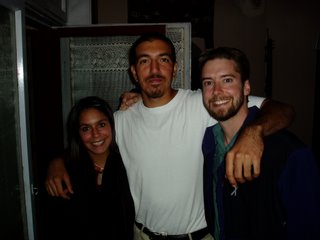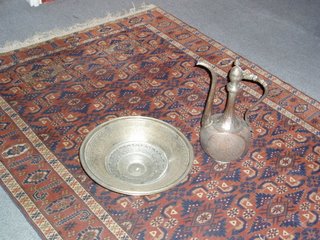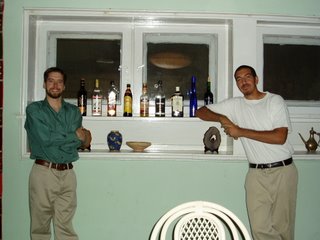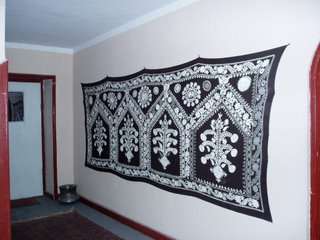



Wednesday night Nathan and I went over to Waise's house for his going away party. He was planning on leaving in a few weeks, but due to series of unfortunate events with the Afghan minister of defense he decided to leave sooner than planned. We went over around 7, because Waise wanted us to help set up for the party. I was envisioning meeting Waise's family and friends, but turns out Waise's father was out of town and the party ended up being mostly NGO workers (which was fine with me).
Waise's father collects Afghan craftwork; tapestries, swords, and all kinds of little works of art. It was cool to see these displayed in an Afghan house, although I wouldn't describe either the home or lifestyle as "traditional". We hung out with Boogie Nights playing on the TV in the background drinking and chatting. I met a guy who lived in Jerusalem for a while, and another who was studying at the American University of Cairo this past year. Rory Stewart, the guy from the Turquoise Foundation showed up late -- and remembered my name, which surprised me. After shoveling a plate full of food into my face around 10pm (I'd been under the impression we were going for a late iftar, and so was absolutely starving by the time the food showed up), I settled down next to Ben from Pittsburgh and started chatting with him. Then, Rory came over and plopped down on the ground next to me.
Now, my last encounter with Rory was a weird combination of intellectually stimulating and annoying, so I wasn't sure where this was going. Ben immediately started talking to someone else (Rory is his boss), so I was stuck. The conversation started out okay, but turned into an hour long discussion of the evils of NGOs with Rory quizing me about how I would handle myself in different situations and why was I in Afghanistan anyway? So, I explained that I was hardly an expert on Afghanistan and I couldn't answer his questions about my vision for Afghanistan in 20 years or what exactly the NGO community hoped to achieve in the long term. He responded by telling me that I was absolutely typical of the NGO community who had no real commitment or connection to Afghanistan or the Afghan people.
The annoying part is that he is right, I don't have any particular connection to Afghanistan . . . I'm just traveling through for a while, here to learn as much as I can while I'm here before moving on to someplace else. . . I've already decided that I won't stay in Afghanistan beyond my scheduled 3 months unless my NGO offers me a job here -- I'm not going to look for other opportunities. I feel too separated from the community I'm trying to help, and I want to live somewhere where I can walk down the street by myself without it being a major security risk.
Eventually the conversation turned to gender in Afghanistan, and how does one work on changing gender relations here? I responded by explaining what my NGO's policy and gender programming is -- and even to myself I sounded like I was reciting a bunch of technical jargon. Rory was arguing that the only way to really institute substantive change is through revolutionary action, and he was using the communist movement as a model. I responded by saying that if Afghanistan is going to have a gender revolution it will have to come from the Afghan's themselves, because it is not the place of the international community to stir up that kind of social conflict in a place that is already pulsing with anger at the foreign occupiers. Besides, if radical gender shifts are forced by outsiders, they will be viewed as an invasion of foreign culture and won't last. These sorts of changes have to be homegrown to take root - never mind the danger to Afghan women (and men) trying to radically change society right now. It would be easy, and irresponsible, for internationals to stir that up and then run away when things got messy. Then he asked me, well what are you doing here then?
I said that we are laying a foundation, helping Afghan men and women create a platform that they can use to institute the kind of gender changes that they find appropriate for their culture and society. But how can the NGO community accomplish that if they are not commited to staying here for the long haul? That wasn't Rory's question, it was mine.
I was relieved when it was time to go; talking to Rory is uncomfortable partially because he is so socially awkward -- he stares at the ground while the other person talks and grimaces constantly -- but mainly it is uncomfortable because he asks me questions that I don't have answers to, nebulous questions that were already gathering on the horizon of my consciousness but that hadn't crystallized yet. And, if I'm going to be honest, because no one likes to be told that they are an absolutely typical representative of NGO workers - young, idealistic, and ignorant. That bruised my ego and put me on the defensive early in the conversation - particularly because at least two of the three are true in the context of Afghanistan.
He asked me if I'd be willing to live in an Afghan village for 20 years and work on gender issues. The suggestion of living the rest of my life that way was not at all appealing to me. I responded that I'd be willing to do that in a Palestinian village, but I didn't know Afghanistan well enough to say yes or no. But that wasn't true -- I already know that I wouldn't be willing to live in an Afghan village for 20 years.
In totally unrelated news, I have been promoted from intern to gender analyst. Well, not really. That is what my business cards will say, but I'm still getting intern pay and none of the expat employee benefits. But, it will look much better on my resume.
I'm considering not coming home for Christmas, and instead going to Beirut to visit my good friend Marcy and look for work and then to Syria to visit my friend Bob. Just thoughts at the moment. . .
*** 1st pic is of myself Waise and Nathan; 2nd is of a basin and jug similar to what Waz used to wash our hands before dinner (see earlier entry); 3rd is of Nathan and Waise and the liquor for the party (how terribly un-Ramadan of us); and the last if of a tapestry hanging in Waise's house.

1 comment:
its meshari. very interesting on how your arn't really allowed out of the compound to actually attempt your job. Your boss sounds evil but he does have a few good points. I agree highly on how a revolution should start by the afghanie's and not by outsiders.
I miss you sis, see you in the new year
Post a Comment